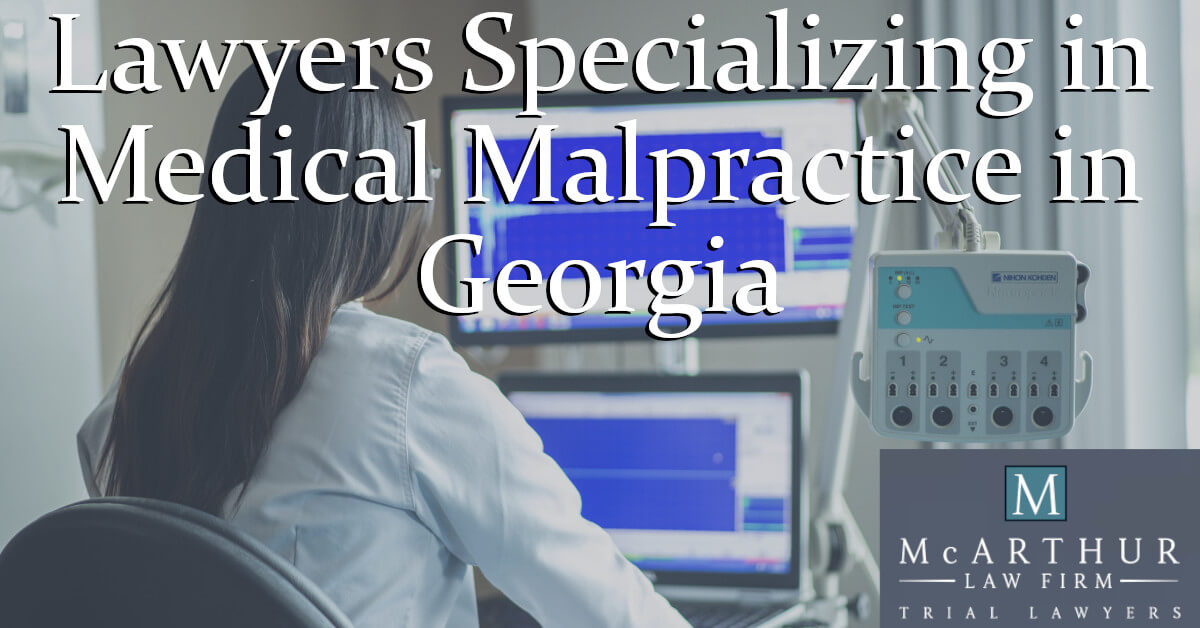Medical Malpractice Lawyers in Georgia
The civil litigation area called “medical malpractice” covers many errors in healthcare. These mistakes can seriously harm patients.

They often happen due to misjudgments or oversights by doctors, nurses, hospitals, or other medical staff. Such errors can lead to serious injuries or even a patient’s wrongful death for not receiving proper medical treatment. Talking immediately to a medical attorney is a wise move, for reasons that will be set forth below.
What is medical negligence? Knowing the common types of medical malpractice cases can help you decide if you have a reason to sue. Victims of medical malpractice often face many challenges.
They need skilled legal help, but many are hesitant to take legal action against a doctor, a PA (physician’s assistant), or a registered nurse. Our Firm has multiple trained Atlanta medical malpractice attorneys and is one of the Peach State’s top medical malpractice law firms when Kathy McArthur started law practice in 1980.
Typical instances of medical malpractice may include:
- Misdiagnoses or unreasonable delays in diagnosis of a serious illness or condition
- Errors made during surgery or the post-surgery recovery process
- Mistakes in prescribing medications, dispensing medicine or intravenously administering drugs to a patient
- Multiple types of problems during childbirth
Each of these categories can present specific and different difficulties and consequences (or lack thereof) for the healthcare provider. A key factor that must be established is negligence resulting in harm that was suffered by the patient.
Understanding the Risk of Death from Medical Errors in the United States

In such cases, medical neglect lawyers with MLF may be able to help you, and your family recover a civil judgment or settlement against a hospital, doctor, or nursing home for that error, injury or death caused by a medical procedure gone wrong. At our firm, we have several Georgia medical malpractice attorneys skilled in litigating civil cases involving errors made by State-licensed professionals in the medical or dental field.
Each section below provides an extensive examination of manifestations of possible malpractice. These examples shed some light on the origins of the errors as well as their potentially harmful impact on the patient that our medical negligence attorneys have encountered.
Common Types of Medical Malpractice Cases in the Peach State

It can be hard to understand which medical treatments have more flexible standards. However, the standard of care in the United States is usually similar across different types of treatments, regardless of the State where the case happened.
However, the description below provides some specific contexts where the medical malpractice standard may vary:
- Emergency Care: Under Georgia law, in urgent scenarios like those in hospital emergency rooms, the bar for demonstrating medical malpractice is set higher. The criterion in this context is “gross negligence,” implying that the plaintiff has to prove that the actions of the healthcare provider were exceedingly negligent, not just a mere failure to uphold the standard of care.
- Telemedicine: Telemedicine usage has expanded, providing versatility in care delivery, yet it still necessitates compliance with recognized care standards. The Georgia Composite Medical Board has established regulations for telemedicine procedures, guaranteeing that despite the variation in delivery mode, the quality and standard of care are on par with face-to-face consultations.
- Targeted Therapies: Some targeted therapies may have more intricate standards due to their intricate nature and continuous evolution. For instance, gender-confirming therapies for transgender people may have distinct protocols that deviate from broader medical practices. These therapies necessitate meticulous evaluation and management customized to a person’s requirements.
Overall, there are differences in how standards are applied in different situations, like emergencies or through telemedicine issues. However, Georgia expects healthcare providers to demonstrate a reasonable level of care and skill in all medical treatments.
Cases Involving Misdiagnosis and Delayed Diagnosis

A late diagnosis can also be harmful. For example, in cancer cases, the disease can progress unnoticed. This significantly lowers the chances of recovery for patients.
Healthcare providers are expected to give quick and accurate diagnoses based on professional standards. If they fail to meet these standards, it may be seen as negligence.
This can lead to a medical malpractice claim. This is when you need attorneys for medical malpractice to review every aspect of the treatment and medical records, including lab tests, x-rays and radiological results.
Statute of Limitations Rules within the State of Georgia
In Georgia, medical malpractice cases are subject to specific statutes of limitations and repose that dictate the timeframe within which a lawsuit must be filed. Here are the basic rules and some exceptions to that general rule:
A. Various Medical Malpractice Statutes of Limitations
All civil legal actions are “time-limited,” meaning that a claimant can’t wait to act for an unlimited amount of time. The statute of limitations, in Georgia, is generally two (2) years, but some other exceptions exist.
- General Rule is a Two-Year Limit: The statute of limitations for filing a medical malpractice lawsuit in Georgia is generally two (2) years from the date of the injury or death caused by a medical professional’s negligent act or omission to act.
- Discovery Rule: If the injury is not immediately discovered, the statute of limitations may begin on the date when the injury is discovered or should have reasonably been discovered, provided this is still within the 5-year statute of repose. For example, if a surgical glove was left inside the patient and later caused an infection and fever, vomiting and making that person unable to work, once various other tests could not isolate the problem, exploratory surgery may find this problem months or years later.
B. The Statute of Repose for Types of Medical Errors
Five-Year Limit: Georgia’s statute of repose sets an absolute maximum limit of five (5) years from the date of the negligent act or omission, regardless of when the injury was discovered. This means that no medical malpractice action can be brought more than five years after the act that caused the injury.
C. Exceptions to the Rules Shown Above
- Minors: For minors under five years old, the statute of limitations does not expire until their seventh birthday. If a minor is injured before turning five, their parents have until two (2) years after their seventh birthday to file a claim.
- Foreign Objects: In cases where a foreign object is left inside a patient’s body, there is a one-year statute of limitations from the date the object is discovered, regardless of how long it has been since it was left in the body.
- Fraud: If fraud by a healthcare provider prevents the discovery of malpractice, the statute of limitations may be tolled (paused) until the fraud is discovered. However, proving fraud requires meeting a very high legal standard.
These statutes are designed to ensure timely filing and resolution of claims while balancing fairness to both patients and healthcare providers. It is crucial for anyone considering a medical malpractice claim in Georgia to consult with an experienced med mal attorney to navigate these complex rules effectively.
How to Secure Your Free Medical Malpractice Attorney Consultation
The top medical malpractice lawyers at McArthur Law Firm are highly skilled and experienced in handling medical malpractice cases. The Firm provides no-cost consultations for prospective clients. A legal expert from MLF will always provide prospective clients with a free consultation.
For answers to some of the most frequently asked questions about medical malpractice in Georgia, feel free to reach out to our Georgia-based attorneys. Connect with highly trained lawyers at any of our office locations by dialing our Atlanta main line at 404-565-1621 or our nationwide toll-free vanity number, 1-855-WARRIOR [1-855-927-7467].
After the case facts are understood, if the case is a viable one, our Team will accept your case the undertake a detailed review of medical records applicable to your legal case. Once the client retains our firm, our fee payment comes at the end of the case, derived as a percentage of the compensation that our legal warriors secured for your case.
So, why not get your medical malpractice lawyers’ free consultation? You have everything to gain and nothing to lose.








